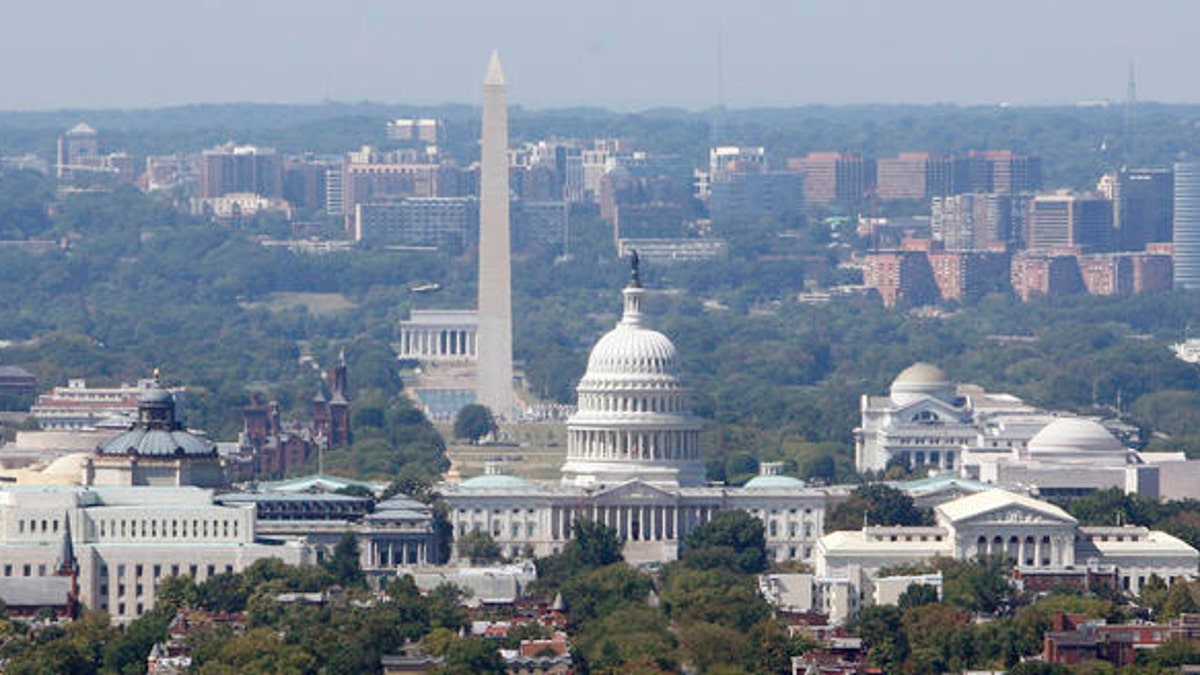
Aug. 2009: The Washington skyline featuring, from left, the Lincoln Memorial, Washington Monument and the Capitol. (AP)
While the nation's capital is at its most divided, a cadre of Republicans and Democrats -- refugees from earlier administrations -- is quietly reaching over political divides to get the nation's work done.
Despite the loud rhetoric from both ends of Pennsylvania Avenue, there are a core group of us who have served in multiple administrations, who hail from industries outside of Washington, who hold different points of view, who find ways to collaborate.
I am a registered Republican and have served four presidents, including one Democrat. And I also partnered with Michelle Obama’s office on Let’s Move anti-obesity campaign. Over the last 15 years as I built complex public private partnerships to help solve big problems, I succeeded by modifying Ronald Reagan’s 80/20 rule. I created my own 60/40 rule: if I agree with someone on 60 percent of the issues, we can agree to disagree on the 40 percent and focus our collective energy on areas of commonality.
I am by no means unusual among a strata of people who line up on one side of the aisle but find ways to work with the other side.
“Patriotism is supporting your country all the time, and your government when it deserves it,” Mark Twain wryly noted. His observation is shared by many across the political spectrum with whom I have worked.
In 2009, 16 CEOs from consumer goods companies joined me as members of the Healthy Weight Commitment Foundation. Working collaboratively with public health agencies and the Obama administration, the conservatives and liberals among us joined forces to implement the largest voluntary food and beverage industry marketplace initiative, ultimately removing 6.4 trillion calories from the American diet by reducing the sugar and fat content of hundreds of products. In 2005, as U.S. Commissioner General I worked alongside governors – from both parties -- and the private sector. We overcame our ideological differences and many challenges and together launched the US Pavilion at the Aichi World EXPO, formerly known as the World’s Fair.
A similar approach is on display in any of a number of bipartisan commissions and blue ribbon panels that have toiled away on important issues as diverse as Social Security, biodefenses, tax reform and the Sept. 11, 2001, terrorist attacks. Many are ongoing, at the state and federal level, even amid the rancor that permeates current politics. These efforts succeed because the end goal is what matters. Party ideology does not. Away from the fishbowl of D.C., the participants, whatever their affiliation, conclude that serving the nation eclipses serving as a party emissary.
“Patriotism is supporting your country all the time, and your government when it deserves it,” Mark Twain wryly noted. His observation is shared by many across the political spectrum with whom I have worked.
The efforts I have worked on employ the principles of bipartisanship common in so many areas beyond politics -- in the office, at the doctor’s office, at the playground, at church and at home. We focus on personal consideration, listening and respect. We know that if we want succeed, we can’t expect others to approach the problem in the identical way, so it becomes imperative to do things differently. Turn the idea on its head. Think of new paths and be bold.
We politely keep commentary to ourselves unless it’s relevant to the discussion at hand. We focus on fixing the problem--no rat holes are allowed. Tension may reign at the beginning of each relationship as battle lines are quickly drawn and cynicism prevails, but soon data-driven progress brings a continuity of results, a collegial environment and a celebration of success. Over dinner or on the Acela, good humor prevails as we find ourselves sharing stories and learning about each other’s children, grandchildren, lives and challenges. We agree to disagree but commit to the facilitation of success. We become friends.
Ronald Reagan won the nation over with his sunny optimism. But we are in danger of losing the graciousness that Reagan epitomized in political discourse if we don’t pause and remember that the shouting on cable TV and the blogosphere is not the whole picture by a long shot.
Bipartisanship is not dead. It is alive, certainly not as well as it could be, and in need of further nurturing.
